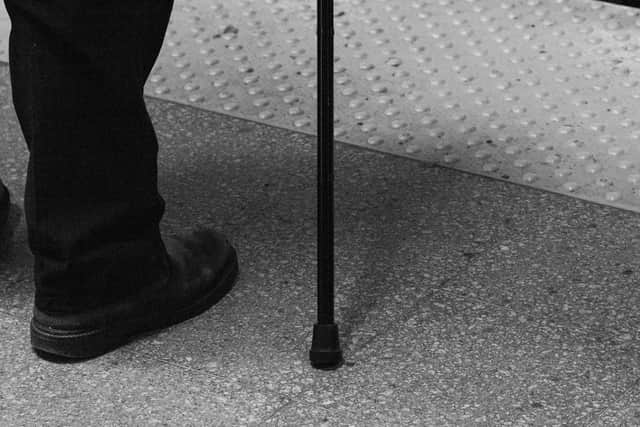Blackpool has lowest disability-free life expectancy in England
and live on Freeview channel 276
Out of 150 areas in England, Blackpool ranked the worst in terms of how long people will live before developing a disability or health condition, with a significantly lower total life expectancy than other areas in England.
The Centre for Ageing Better revealed "unacceptable" inequalities in how long, and how healthily, babies born in different areas of England are expected to live.
Advertisement
Hide AdAdvertisement
Hide AdBoys born in Blackpool today can expect to reach age 52 without a long-term physical or mental health condition that limits their daily activities, and girls are expected to reach 53.


Figures show total life expectancy at birth for girls born in Blackpool is 79.5 years, and 74.5 years for men.
Some of the highest life expectancy at birth rates in England were found in six London boroughs, where boys born in Kensington and Chelsea can expect to live 8.8 years longer than boys born in Blackpool.
But the widest gaps appear within the healthy life expectancy figures, with boys born in Blackpool set for nearly 20 fewer years of good health than those born in Richmond, London.
Advertisement
Hide AdAdvertisement
Hide AdAfter studying ONS figures for healthy, disability-free and total life expectancy, Ageing Better called for the Government to "close the health gap between rich and poor."
Anna Dixon, chief executive for Ageing Better, said: "Most of us are set to live many years longer than our parents or grandparents – and these extra years are a wonderful gift.
"But the opportunity of longer lives isn’t being shared equally, especially when it comes to how healthily we spend our later lives.
"These figures show that nowhere outside London and the South East can both boys and girls born today expect to reach their state pension age without a disability.
Advertisement
Hide AdAdvertisement
Hide Ad"We will be letting down today’s children if we fail to improve their prospects for a healthy later life.
"The deep inequalities this data reveals are unacceptable, and cannot be tolerated. The government must recommit to the goal of closing the gap in disability-free life expectancy between the richest and poorest by 2035, and take the action needed to make good on that commitment.
"This doesn’t just require more funding for health services but investment in improved housing, better quality work and communities, as well as further regulation on tobacco, alcohol, and unhealthy foods.”
Last month, the Gazette reported that Wynfield House deaf home on Newton Drive, Blackpool would shut in April after a lack of funding to keep it going, sparking concerns that not enough money was available for disabled people living on the Fylde coast.
Advertisement
Hide AdAdvertisement
Hide AdStuart Murray, access champion at disability charity Access Fylde Coast, said the new figures were "concerning" and that money was being spent "in the wrong places."
"We educate and train local businesses to become more accessible for disabled people in Blackpool, Wyre and Fylde, because there are a lot of disabled people here, especially in Blackpool, he said.
"I've lived in Blackpool since the 1970's and it's got worse and worse. There isn't enough money in the area, money goes to support tourism such as building new leisure centres, but what about the people who live here who need help?
"It's is one of the most deprived areas of the country, with a lack of full-time jobs and too many seasonal ones, which is detrimental to employees' emotional and physical well-being.
Advertisement
Hide AdAdvertisement
Hide Ad"Wages here are lower than most places in the country. and disabled people have no choice but to carry on working. Disability First, which works across Lancashire and Cumbria, has seen a big increase in disability benefit applications and I'd say it's because there isn't much help for people who are either mentally or physically disabled."
In July 2019, the Government published the Prevention Green Paper, setting out its intentions to implement a "prevention is better than cure" policy across public health in the UK.
It plans to acknowledge not only how long people are expected to live, but for how long they will live in good health.
The preliminary report outlined the necessity for "targeted support, tailored lifestyle advice, personalised care and greater protection against future threats."
Advertisement
Hide AdAdvertisement
Hide AdNow Ageing Better have called for the Government to recommit, and make good on its promise to ‘level up’ and reduce the gap in disability-free life expectancy between the richest and poorest.
Blackpool council's director of public health, Dr Arif Rajpura said he agreed with Ageing Better's recommendations for tackling healthy living in more deprived areas.
"They are spot on when they say it's not just about health services but also about wider determinants of ill health like good quality housing, properly paid employment and good levels of education," he said.
"I would also be reiterating to them that we would like the Government to support stronger regulation when it comes to food, alcohol and tobacco and to introduce minimum unit prices for alcohol at the earliest opportunity.
"I'd like to see the Government put back all the funding cuts to local government and public health budgets, as austerity is stifling our abilities to narrow the inequality gap."